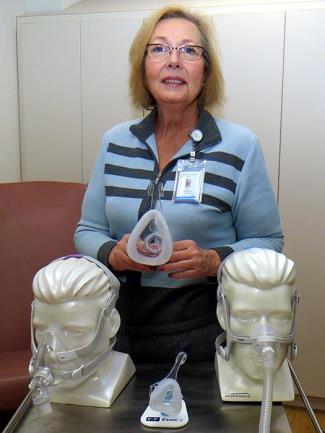BRIDGEPORT, CT (March 9, 2017) – The medical director of Bridgeport Hospital’s Center for Sleep Medicine says the start of Daylight Saving Time this month – and the resulting “loss” of sleep from pushing clocks ahead one hour – is a good occasion for people with chronic snoring problems or other sleep-related disorders to seek help from a sleep medicine specialist.
“Ironically, snoring is an indication that a person may already be awake,” says Armand Wolff, MD. “Snoring is a classic symptom of sleep apnea, a condition caused by obstruction of the airway. The inability to breathe properly literally wakes up the sleeper – sometimes dozens of times in a single night. The sleeper may have no idea these waking episodes are happening, unless someone else notices.”
Dr. Wolff says other symptoms of sleep apnea can accompany snoring. These include extreme sleepiness during the day, insomnia, inability to focus, irritability and headache. Over a longer period, if the condition is untreated, he says far worse issues may occur – high blood pressure, stroke, heart attack, heart rhythm problems, diabetes, depression and more.
“Simple testing by a qualified sleep lab can confirm a sleep apnea diagnosis or other related conditions and help your doctor prescribe an effective course of treatment,” Dr. Wolff said. “Sometimes, testing can even be provided in the patient’s own home.”
Bob Ferrara’s high blood pressure is what led to his sleep apnea diagnosis last year. The 78-year-old Stratford resident was referred to the Center for Sleep Medicine during a routine visit with Bridgeport Hospital Chief of Cardiology Stuart Zarich, MD. After a couple of rounds of testing, the sleep apnea diagnosis was confirmed and treatment began.
“Dr. Wolff told me I was waking up as many as 70 times a night,” Bob said.
Treatments for sleep apnea can vary but the usual course of action is wearing a continuous positive airway pressure (CPAP) device, which pumps a gentle stream of air into the airway, keeping it open during sleep. Older and larger CPAP masks covering both nose and mouth have been supplemented in recent years by more comfortable nasal-only models. The Center for Sleep Medicine provides fitting and testing to ensure that each patient has a device that is most comfortable individual tastes.
One risk factor for sleep apnea is obesity, and sometimes, simply losing weight can help alleviate the condition. Surgical options are also available for providing a less obstructed airway.
There has also been a trend toward more home testing, versus spending the night in a sleep lab. This option allows the patient to be fitted with equipment during an office visit, then carry home a portable device that measures breathing patterns, heart rate and other physical activity during sleep. The portable device is then returned to the sleep lab and the results are analyzed.
“I’m a mouth breather, so the nasal mask didn’t work for me,” Bob said. “A smaller, more modified face mask finally did the job. The Center for Sleep Medicine staff was very good, very caring. They took the time to get the right fit.”

